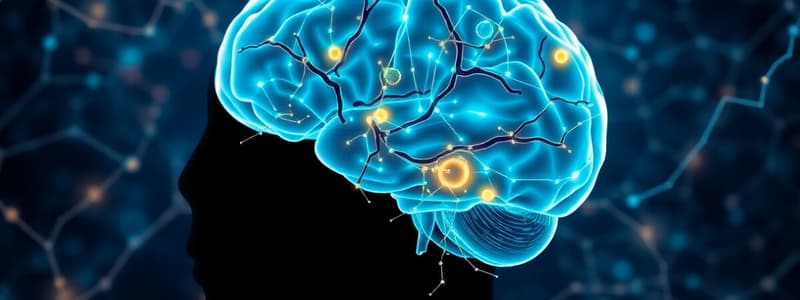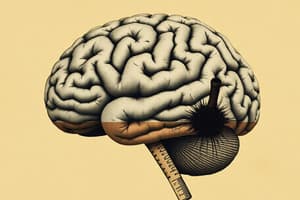Podcast
Questions and Answers
What does cognitive neuroscience aim to achieve?
What does cognitive neuroscience aim to achieve?
- Explain cognitive processes through cultural influences
- Understand the relationship between emotions and society
- Develop methods to enhance brain capacity
- Explain cognitive processes in terms of brain-based mechanisms (correct)
Which of the following best describes reductionism in cognitive neuroscience?
Which of the following best describes reductionism in cognitive neuroscience?
- Understanding the mind and body as completely separate entities
- Analyzing complex phenomena by examining social behaviors
- Describing cognitive concepts in terms of biological processes (correct)
- Focusing solely on emotional aspects of cognition
What philosophical viewpoint argues that the mind and body are distinct and interact through the pineal gland?
What philosophical viewpoint argues that the mind and body are distinct and interact through the pineal gland?
- Dualism (correct)
- Materialism
- Reductionism
- Empiricism
What was Aristotle's belief regarding the location of mental experiences?
What was Aristotle's belief regarding the location of mental experiences?
What was a significant question posed by Galen regarding the brain?
What was a significant question posed by Galen regarding the brain?
What concept suggests that cognitive functions are processed in separate brain modules?
What concept suggests that cognitive functions are processed in separate brain modules?
Who is credited with developing the idea of phrenology?
Who is credited with developing the idea of phrenology?
Which area of the brain is specifically associated with speech production according to localizationism?
Which area of the brain is specifically associated with speech production according to localizationism?
What does the Human Connectome Project aim to create?
What does the Human Connectome Project aim to create?
What is the term for a neuron that has one process including both axon and dendrite?
What is the term for a neuron that has one process including both axon and dendrite?
Which type of cell provides structural and metabolic support to neurons?
Which type of cell provides structural and metabolic support to neurons?
What was a significant contribution from Wilder Penfield in cognitive neuroscience?
What was a significant contribution from Wilder Penfield in cognitive neuroscience?
What does the term 'network' refer to in current brain research?
What does the term 'network' refer to in current brain research?
Which of the following describes the role of Purkinje cells?
Which of the following describes the role of Purkinje cells?
What is the main focus of cognitive neuropsychology?
What is the main focus of cognitive neuropsychology?
Study Notes
Cognitive Neuroscience
- Aims to explain cognitive processes using brain mechanisms.
- Studies how the brain gives rise to our thoughts, feelings, and behaviors.
Philosophy of Mind
- Explores the relationship between the mind and the brain.
- Dualism: Mind and body are separate entities and interact through the pineal gland.
- Reductionism: Mind and body are one entity, and cognitive concepts can be explained by biological concepts.
Historical Foundations
- Aristotle (380 BC) believed the heart was the center of mental experiences.
- Galen (130 AD) believed ventricles in the brain contained mental experiences circulated by cerebrospinal fluid (CSF).
- Gall (1810) developed phrenology: specific mental functions were located in different parts of the brain, determined by the size of skull bumps.
Functional Specialization
- Different parts of the brain are responsible for specific cognitive functions.
- Modules: Unique information processing categories (e.g., face recognition, object recognition).
- Example: Face processing occurs in the ventral temporal lobe, while risk assessment happens in the prefrontal cortex.
Cognitive Neuropsychology
- Studies brain damage to understand normal brain function.
- Broca (1860) discovered speech production is localized in the left prefrontal cortex, supporting localizationism: a single cognitive function is localized to a single brain area.
The Birth of Cognitive Neuroscience
- Wilder Penfield (1930s) directly stimulated the cortex of awake patients undergoing brain surgery.
- Stimulation induced "mental" sensations like thinking, perceiving, and remembering.
From Modules to Networks
- Current research focuses on brain networks: dynamically changing patterns of activity across multiple brain regions.
- Networks are functionally specialized, switching on or off depending on the required thought or behavior.
Human Connectome Project
- Aims to map all connections in the human brain.
- Understanding brain wiring will improve treatments for neurological and psychiatric disorders.
Neuroanatomy of the Brain
- Neurons: Specialized cells that transmit information using electrical and chemical signals.
- Glial cells: Support neurons structurally and metabolically.
- Cell body: Contains the nucleus and produces proteins for neuron health and communication.
- Dendrites: Branching structures receiving information from other neurons.
- Axon: Long tube sending signals to other neurons.
Neuron Shapes
- Unipolar cells: One process including both axon and dendrite.
- Bipolar cells: Two processes: axon and dendrite.
- Multipolar cells: More than two processes: one axon and multiple dendrites.
Neuron Structure
- All neurons have the same basic structure, but the placement and shape of axons and dendrites vary.
Neurotransmission
- Communication between neurons through electrochemical signals.
- Synapse: Space between neurons where chemical signals are transmitted.
- Neurotransmitters: Chemical messengers released by neurons, influencing the receiving neuron.
Studying That Suits You
Use AI to generate personalized quizzes and flashcards to suit your learning preferences.
Description
Explore the fascinating intersection of cognitive neuroscience and the philosophy of mind. This quiz covers key concepts including dualism and reductionism, alongside historical foundations from thinkers like Aristotle and Gall. Test your knowledge on how brain mechanisms relate to thoughts, feelings, and behaviors.





